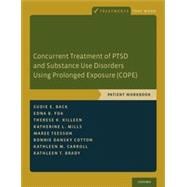
Concurrent Treatment of PTSD and Substance Use Disorders Using Prolonged Exposure (COPE) Patient Workbook
by Back, Sudie E.; Foa, Edna B.; Killeen, Therese K.; Mills, Katherine L.; Teesson, Maree; Cotton, Bonnie Dansky; Carroll, Kathleen M.; Brady, Kathleen T.-
 eCampus.com Device Compatibility Matrix
eCampus.com Device Compatibility Matrix
Click the device icon to install or view instructions
Buy New
Rent Textbook
Rent Digital
Used Textbook
We're Sorry
Sold Out
How Marketplace Works:
- This item is offered by an independent seller and not shipped from our warehouse
- Item details like edition and cover design may differ from our description; see seller's comments before ordering.
- Sellers much confirm and ship within two business days; otherwise, the order will be cancelled and refunded.
- Marketplace purchases cannot be returned to eCampus.com. Contact the seller directly for inquiries; if no response within two days, contact customer service.
- Additional shipping costs apply to Marketplace purchases. Review shipping costs at checkout.
Summary
COPE is an integrated treatment, meaning that both the PTSD and substance use disorder are addressed concurrently in therapy by the same clinician, and patients can experience substantial reductions in both PTSD symptoms and substance use severity. Patients use the COPE Patient Workbook while their clinician uses the Therapist Guide to deliver treatment. The program is comprised of 12 individual, 60 to 90 minute therapy sessions. The program includes several components: information about how PTSD symptoms and substance use interact with one another; information about the most common reactions to trauma; techniques to help the patient manage cravings and thoughts about using alcohol or drugs; coping skills to help the patient prevent relapse to substances; a breathing retraining relaxation exercise; and in vivo (real life) and imaginal exposures to target the patient's PTSD symptoms.
Author Biography
Sudie E. Back, Ph.D., is a Professor in the Department of Psychiatry and Behavioral Sciences at the Medical University of South Carolina, and a Staff Psychologist at the Ralph H. Johnson Veterans Affairs (VA) Medical Center in Charleston, SC. She is Director of the NIDA-sponsored Drug Abuse Research Training (DART) residency and summer research programs at the Medical University of South Carolina.
Edna B. Foa, Ph.D., is a Professor of Clinical Psychology in Psychiatry at the University of Pennsylvania, and Director of the Center for the Treatment and Study of Anxiety. Dr. Foa devoted her academic career to study the psychopathology and treatment of anxiety disorders, primarily obsessive-compulsive disorder (OCD) and post-traumatic stress disorder (PTSD).
Therese K. Killeen, Ph.D., APRN, is an Associate Professor in the Department of Psychiatry and Behavioral Sciences at the Medical University of South Carolina. Dr. Killeen has over 20 years of experience working with adult and adolescent patients with comorbid PTSD and substance use disorders.
Katherine L. Mills, Ph.D., is an Associate Professor at the National Drug and Alcohol Research Centre, University of New South Wales. Dr. Mills is also Director of Treatment Research for the National Health and Medical Research Council (NHMRC) Centre of Research Excellence in Mental Health and Substance Use in Australia.
Maree Teesson, Ph.D., is a National Health and Medical Research Council (NHMRC) Senior Research Fellow at the National Drug and Alcohol Research Centre, University of New South Wales, and Director of the NHMRC Centre of Research Excellence in Mental Health and Substance Use in Australia.
Bonnie Dansky Cotton, Ph.D., is a senior manager at Microsoft Corporation. She received her PhD in Clinical Psychology from Duke University and completed her internship at the Medical University of South Carolina. Prior to her career at Microsoft, Dr. Cotton was an Assistant Professor in the Department of Psychiatry and Behavioral Sciences at the Medical University of South Carolina.
Kathleen M. Carroll, Ph.D., is the Albert E. Kent Professor of Psychiatry at Yale University School of Medicine. She is an internationally renowned researcher on the development of behavioral therapies for substance use disorders. Dr. Carroll is Principal Investigator of the Center for Psychotherapy Development at Yale and Co-Principal Investigator of the New England Consortium of NIDA's Clinical Trials Network.
Kathleen T. Brady, MD, Ph.D., is a Distinguished University Professor and Associate Provost for Clinical and Translational Science at the Medical University of South Carolina. Dr. Brady is Director of the Women's Research Center, Director of the MUSC Clinical and Translational Research Center (CTSA), and Director of the Southern Consortium of NIDA's Clinical Trials Network.
Table of Contents
Chapter 1: Introduction
Chapter 2: Is This Program Right for You?
Chapter 3: Session 1
Chapter 4: Session 2
Chapter 5: Session 3
Chapter 6: Session 4
Chapter 7: Session 5
Chapter 8: Session 6
Chapter 9: Session 7
Chapter 10: Session 8
Chapter 11: Session 9
Chapter 12: Session 10
Chapter 13: Session 11
Chapter 14: Session 12
Appendices
An electronic version of this book is available through VitalSource.
This book is viewable on PC, Mac, iPhone, iPad, iPod Touch, and most smartphones.
By purchasing, you will be able to view this book online, as well as download it, for the chosen number of days.
Digital License
You are licensing a digital product for a set duration. Durations are set forth in the product description, with "Lifetime" typically meaning five (5) years of online access and permanent download to a supported device. All licenses are non-transferable.
More details can be found here.
A downloadable version of this book is available through the eCampus Reader or compatible Adobe readers.
Applications are available on iOS, Android, PC, Mac, and Windows Mobile platforms.
Please view the compatibility matrix prior to purchase.

